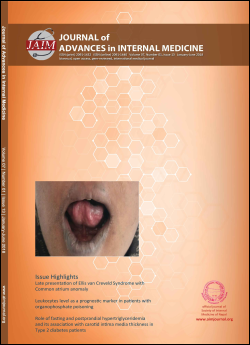Study of Leukocytes level as a prognostic marker in patients with organophosphate poisoning
DOI:
https://doi.org/10.3126/jaim.v7i1.19576Keywords:
Leukocytes, organophosphates, poisoning, prognostic factorsAbstract
Background : Elevated leukocytes level at admission is a common finding in patients with organophosphates poisoning. It has been suggested as a prognostic marker. Since early leukocytosis is frequent and mulifactorial in origin, we hypothesized that leukocytes level after 24 hours may be a better predictor of mortality.
Objectives : To evaluate the prognostic value of leukocytes level at admission; and at 24-48 hours in organophosphate poisoning.
Methods : A hospital based, retrospective, cohort study of patients with organophosphate poisoning was conducted in Manipal Teaching Hospital, Pokhara, Nepal. After obtaining ethical clearance from Institutional research committee, records of patients presenting with poisoning were reviewed. 103 records were considered eligible for study. Relevant data were collected in a preformed pro forma and statistical analyses were carried out.
Results : Mean age of 103 participant was 29.4 (SD=11.68). Out of them 57% were females and 43% were males. T-test was applied to test for difference in age, blood pressure, leukocytes at admission, at 24-48 hrs and blood sugar of those patients with different outcomes. Except for leukocytes levels at admission (p=0.104), statistically significant difference was seen in all other parameters (p<0.001). Logistic regression analysis indicated that leukocytes levels at 24-48 hrs (B=0.002, p=0.013) is a better predictor of mortality than leukocytes levels at admission (B=0.000, p=0.034).
Conclusion : Our analysis supports the hypothesis that leukocytes level at 24-48 hrs is a better predictor of mortality than leukocytes level at admission. However further study with a prospective design is recommended to confirm or refute the hypothesis.
Downloads
Downloads
Published
How to Cite
Issue
Section
License
This license enables reusers to distribute, remix, adapt, and build upon the material in any medium or format, so long as attribution is given to the creator.




